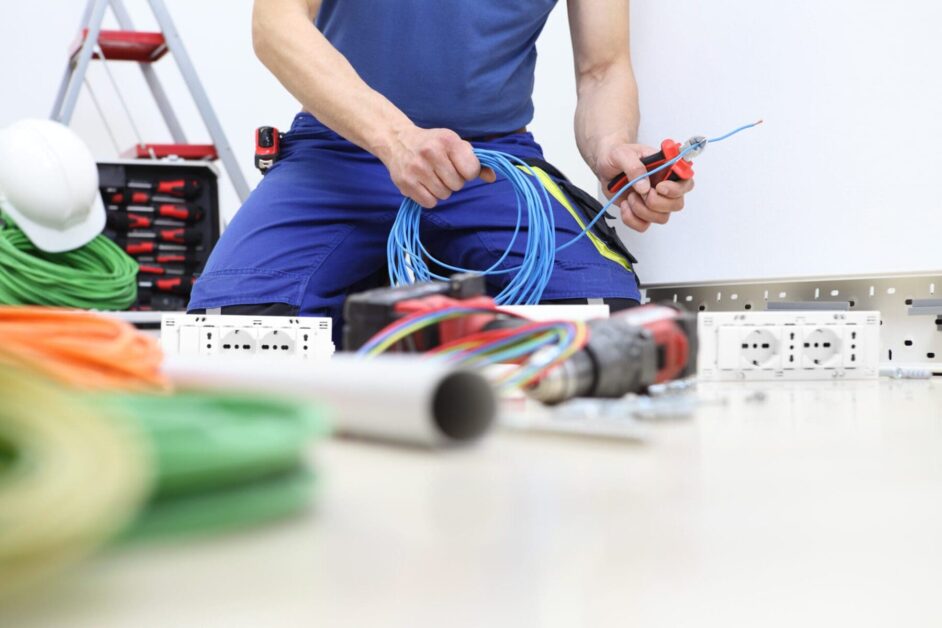The difference between residential and commercial electrical work is significant. While both involve electrical systems, the requirements, complexities, and regulations governing each type of service differ substantially. A common question is whether a residential electrician can perform commercial electrical rewiring services. The short answer is that while a residential electrician might have some foundational skills, commercial electrical work typically requires additional expertise, experience, and certifications. Let’s explore this topic in depth. Important Before delving into whether a residential electrician can handle commercial Electrical Rewiring Services, it’s important to understand the key differences between residential and commercial electrical work.
Scale and Complexity:
Residential Electrical Work:
Residential electricians primarily work on smaller-scale projects, such as wiring single-family homes, apartments, or townhouses. Their systems typically involve single-phase power with lower voltage requirements (120/240V). A home’s electrical demands are generally straightforward, with circuits designed for lighting, heating, and general appliance use.
Commercial Electrical Work:
On the other hand, commercial electricians work on larger and more complex systems. Commercial buildings, such as offices, factories, and retail spaces, often require three-phase power and higher voltage (up to 480V) to handle the significant electrical load. These systems must accommodate a wide range of specialized equipment, lighting, and HVAC systems, making the design and implementation far more complex.
Wiring and Materials:
Residential Wiring:
The wiring is typically hidden within walls, attics, and basements in homes, using materials like Romex (NM cable). The wiring system is designed to meet the electrical needs of household appliances and devices.
Commercial Wiring:
Commercial environments often use different materials and methods. For example, conduits, metal-clad cables, and more robust wiring systems are common in commercial settings. The wiring must withstand higher loads, wear and tear, and meet stricter safety standards.
Code and Regulatory Requirements:
Residential Codes:
Residential electricians must adhere to the National Electrical Code (NEC) and local building codes. These regulations ensure that the electrical systems in homes are safe and meet minimum performance and safety standards.
Commercial Codes:
Commercial electricians follow the NEC but often face additional regulatory requirements depending on the type of building, its use, and its occupancy. Commercial work must comply with stringent fire safety codes and energy efficiency standards and often requires regular inspections and certifications.

Can a Residential Electrician Perform Commercial Rewiring?
Knowledge Transfer:
A skilled residential electrician may have the foundational knowledge to understand the principles of commercial wiring. They know how electrical circuits work, how to install wiring, and how to troubleshoot common issues. However, commercial systems often involve more complex designs, higher voltage, and greater electrical loads that require specialised knowledge and experience. Without this, a residential electrician may struggle to safely and effectively handle commercial rewiring.
Training:
Commercial electricians typically undergo additional training and certification to understand the complexities of commercial electrical systems. They are trained to work with higher voltages, more intricate systems, and the specific safety protocols required for commercial environments.
Legal Requirements:
In many regions, electricians must hold specific licenses to perform commercial work. While a residential electrician may be licensed for residential projects, they might not have the required certifications to perform commercial rewiring legally. This can vary by state or locality, so checking the local regulations is essential.
Insurance and Liability:
Commercial projects often require higher levels of insurance and bonding. A residential electrician may not carry the necessary coverage to work in a commercial setting, which could lead to legal and financial risks for both the electrician and the client.
Safety Risks:
Commercial electrical systems are inherently more dangerous due to their higher voltages and complexity. Without the appropriate training, a residential electrician could inadvertently create safety hazards, leading to electrical fires, equipment damage, or even personal injury.
Inspection and Compliance:
Commercial electrical work must often pass rigorous inspections to ensure compliance with codes and regulations. If a residential electrician attempts commercial rewiring without the necessary expertise, the work may fail inspection, leading to costly delays and potential rework.
When Might a Residential Electrician Be Suitable?
There are scenarios where a residential electrician might be suitable for certain types of commercial work, particularly in small commercial settings or mixed-use buildings where the electrical demands are like those of a large home. For example:
Small Offices or Retail Spaces:
Suppose the commercial space is small and the electrical needs are relatively simple (like a residential environment). In that case, a residential electrician with some commercial experience might be able to handle the job.
Assisting a Commercial Electrician:
In some cases, a residential electrician may work under the supervision of a licensed commercial electrician. This allows them to gain experience while ensuring the work meets commercial standards. Ohmatic Electrical LTD is a reliable provider of complete electrical services specializing in residential and commercial projects.





I really enjoyed the way this was laid out.